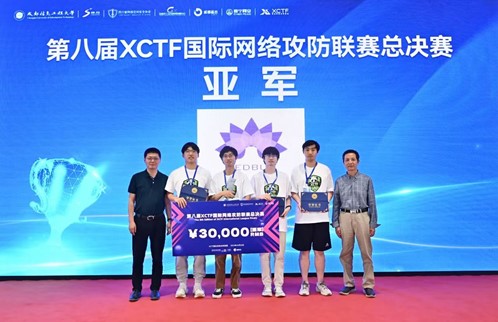Tsinghua University Student Team Takes Second Place in XCTF Cyber Attack and Defense League Finals
On June 23rd, the two-day finals of the 8th XCTF International Cyber Attack and Defense League ended successfully in Chengdu, Sichuan. A total of 24 teams entered the finals through multiple selections. The student team Redbud guided by the Tsinghua University Network Research Institute won the runner-up in the finals.
Tsinghua University’s Redbud team was formed under the guidance of the Student Network Security Technology Association under the guidance of the Network Research Institute. Associate Researcher Zhuge Jianwei served as the instructor, and four students, Wang Qi (Network Research Institute), Wang Kaihua (Network Research Institute), Wang Zihan (Department of Computer Science) and Li Yishen (Zhili College) participated in the finals as official team members.
On the first day of the finals, the Redbud team scored “first blood” (the first to solve the whole game) in the problem-solving competition Pretender and ezthink, and scored 3,600 points in 5 questions. They ranked fifth in the problem-solving competition and entered the top eight of the team competition, and qualified for the KOH finals. On the second day of the finals, the battle became more intense. The members of the Redbud team fought hard and defeated and eliminated strong opponents with scores of 177 to 100 and 1,500 to 400 in the quarter-finals and semi-finals respectively, advancing to the final round to compete for the championship.
In the end, Tsinghua University’s Redbud team won the runner-up in the finals. The National University of Defense Technology’s b3f0re team won the championship, the United University team S1uM4i won the third place, and the Beijing University of Posts and Telecommunications’ Tianshu Dubhe team won the fourth place.
XCTF International Cyber Attack and Defense League is the earliest cyber security skills competition held in China. It has been held for eight sessions since 2014 and has become the largest cyber security league in Asia in terms of participating teams and personnel. The finals questions combine the world’s top cyber security technologies, integrate the latest research ideas and results into the questions, and involve multiple cutting-edge research fields. The competition involves three types of cyber security competition systems: the first day’s problem-solving competition focuses on quickly solving difficult cyber security challenge questions, and a Live Solo competition is held simultaneously. The second day’s competition adopts the KOH peak duel system based on the results of the first day’s problem-solving competition.

